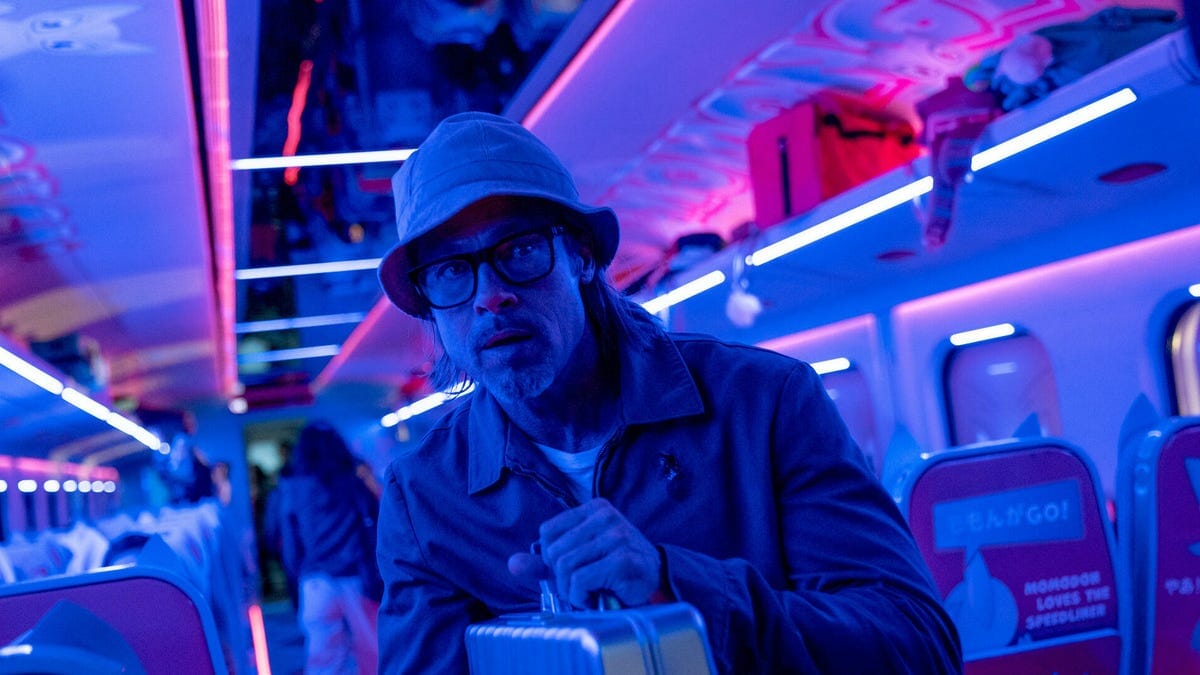Eagle-eyed viewers may notice that Bullet Train, a Japan-set adaptation of a Japanese novel, has a shortage of Japanese characters. That’s no accident, obviously and unfortunately. Attempting to rationalize this whitewashing, the president of Sony Pictures stated that casting white stars “[gives] the movie a chance … to work on a global scale,” playing into the racist myth that Asian stars can’t attract a global audience. The film shoots itself in the foot with its casting—but not content with wounding itself, it finishes the job with a mangled screenplay and corny tone.
READ ALSO: Read all of Ryan Bordow’s movie reviews here
The Kōtarō Isaka novel on which Bullet Train is based is, by some reports, funny. It’s a darkly comedic thriller about five hitmen stuck on a train from Tokyo to Kyoto—gallows humor is inevitable. But to Bullet Train, written and directed by (white guys) Zak Olkewicz and David Leitch, gallows humor is, like, a pun about the gallows. Its blasé jokiness is suspiciously familiar. During development, reportedly, the film transitioned from a “violent action thriller” to a “lighthearted action comedy,” which doesn’t strike me as a natural, collaborative decision. It sounds like a studio mandate to emulate the industry’s most profitable model: Disney’s. When it comes to adapting gleefully violent source material, Bullet Train feels like Hollywood’s dry run for Deadpool 3—how few squibs and how many quips can still earn an R rating?
The film seems embarrassed to have passed the PG-13 threshold. Leitch is a more than capable action director, and the hand-to-hand combat is highly watchable—clear shots, clean editing, fun choreography, and, of course, impressive stunt work (Leitch was once a stuntman for star Brad Pitt). But the action scenes are far too brief and few and far between. They’re two-minute breaks from the meat of the movie: self-satisfied jokes. Bullet Train is 70% riffing between mostly static characters. There’s nothing wrong with a heavy dose of humor, but the action-to-comedy ratio is all off. And the humor isn’t funny.
The age of blockbuster homogenization has muddled the role of tone in comedy. If everything feels like a Marvel movie all the time—lighthearted, inconsequential, periodically exciting fan service—there’s no discernible norm for humor to buoy, subvert, or disrupt. Consider some better action-comedies: Shaun of the Dead takes its horror so seriously that the jokes feel like forbidden fruit; The Nice Guys works because its inept protagonists clash with the hard-boiled detective framework; Black Dynamite straddles a hilarious middle ground between homage and parody. An ideal Bullet Train adaptation might feel like a farce breaking out in a hyperviolent cage, but Olkewicz’s script is just a bad stand-up routine performed in front of a green screen.
Without jokes, it wouldn’t coalesce into anything else. The narrative lacks momentum, which should be a crime for a movie titled Bullet Train. The story is structured in chapters, ostensibly to mirror the source material—a conflict starts and ends in one scene, the assassins run into each other one at a time, etc.—but this neutralizes or delays each new threat by the end of its “chapter.” Rarely, if ever, does tension build. And in keeping with the lighthearted tone, the protagonists treat their overarching foe—a Russian mob boss called the White Death—like an annoyance at worst, giving the audience no reason to fear vicariously. The film is a void into which more of the same is dumped: self-aware jokes, bright candy lighting, celebrity cameos, product placement. Fragmented by its stop-and-start pace, it plays like a museum reel on cinema’s 21st-century decline.
Putting a face on the disaster is Brad Pitt, who’s more fun than the movie deserves. He leans into the contrasts of his character—an assassin in therapy—with charm only he could muster, turning buzzword-ridden dialogue into cheeky self-parody. It’s, thankfully, more acting than shtick: an actual performance in a Ryan Reynolds role. The other actors struggle to heighten the material. Brian Tyree Henry, playing an assassin who sees the world through the lens of Thomas the Tank Engine, isn’t manic enough to lend his quirk an edge. He’s just a cringey punchline machine. At least he’s in good company.
The few Japanese characters are sanded down to themes of family and fate, which feels especially ugly when the white leads start riffing on those themes. By the time the Russian mob boss shows up as Michael Shannon in a (bad) wig, Bullet Train, in addition to its myriad other failings, stands as a monument to dumb ethnocentrism. It’ll make millions.
★ (1/5)




